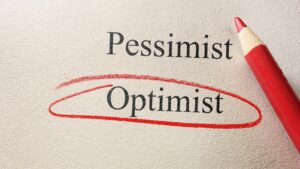Contents
The Power of Optimism: Live A Happy Life
Optimism is a powerful force. Optimistic people are happier, more successful, and healthier than those who do not have an optimistic outlook on life. Optimists believe that they can control their destiny – whereas pessimists feel like they’re at the mercy of luck. Optimism doesn’t just affect your mental health, it also affects your physical health because research has shown that optimism helps you avoid illness. It’s time to start believing in yourself!
What Is Optimism?
 Optimism is an attitude where people think good things will happen. Optimists are hopeful and confident in success. They are different than pessimists who think bad things will happen. Optimism has many benefits, including better coping skills, lower stress levels, better physical health, and more persistence when pursuing goals.
Optimism is an attitude where people think good things will happen. Optimists are hopeful and confident in success. They are different than pessimists who think bad things will happen. Optimism has many benefits, including better coping skills, lower stress levels, better physical health, and more persistence when pursuing goals.
An optimist is someone who does not give up when things are hard. They will try harder to make the next day better. If you are an optimist, you will not be sad when bad things happen because tomorrow may be better. If you always see the good in things, you may feel that you experience more positive events than others. You may also find yourself less stressed and have better health.
Signs You Are An Optimist
People who are optimistic have some things in common. You can find out if you are an optimist. It is good to be an optimist because they have a lot of benefits, like being happier and more successful:
- Think those good things will happen in the future
- You expect things to be good
- Feel like you will be able to succeed
- You feel that in the future, things will be better
- Think that even good things can come from bad events
- You look at difficulties as an opportunity to learn
- Grateful for the good things in your life
- People want to make the most of opportunities
- You have a good attitude
- You should take responsibility if you make a mistake
- It is okay to have a bad experience. It does not mean that the future will be bad
There are many things that can make you feel more optimistic or pessimistic. It’s often because of how you explain the events in your life.
Explanatory Styles
Explanatory style means how people explain what has happened to them. There are three types of explanations. This can affect whether they are an optimist or a pessimist:
Stable vs. Unstable: Can time change things, or is it like they stay the same?
Global vs. Local: Is a situation just about one part of your life, or is it about the whole thing?
Internal vs. External: Do you think that events are caused by you or by something outside of yourself?
Realists see things very clearly, but most people are not realists. Many people either think everything is great or that it is all terrible.
Optimist Explanatory Style
 Optimists believe that positive things happen because of their actions and their personal qualities. They also think that there will be more good things in the future, and good things happening to them in other parts of their lives.
Optimists believe that positive things happen because of their actions and their personal qualities. They also think that there will be more good things in the future, and good things happening to them in other parts of their lives.
Negative events are not seen as being their fault (extrinsic), nor are they perceived to be isolated or meaningless anomalies that have nothing to do with other aspects of their life or future situations (local).
A pessimist, on the other hand, will believe that they were passed over for a promotion due to their inability to do the task well and would probably gain more benefits and promotions in the future if they were promoted. It’s likely that because they had a bad month owing to extenuating circumstances, but will improve in the future if they are promoted. Optimists believe that a temporary bad outcome was only due to external factors and will not affect them in the future if they try harder, but pessimists think it is their fault and affects all aspects of their life.
Pessimist Explanatory Style
 Pessimists think that they caused the negative event. They think they make mistakes a lot. Moreover, they also think that mistakes will happen in other areas of their life because they made a mistake in the first place. They think that good things are only due to luck. They are not controlled by people and will probably not happen again.
Pessimists think that they caused the negative event. They think they make mistakes a lot. Moreover, they also think that mistakes will happen in other areas of their life because they made a mistake in the first place. They think that good things are only due to luck. They are not controlled by people and will probably not happen again.
An optimist would see a promotion as something lucky that can happen. They may worry, but they will not worry too much. A pessimist would see the same thing, but they would think it was unlucky and might be afraid to get one again.
How To Practice Optimism?

Understandably, if you’re an optimist, this is good news. Negative events are more likely to slide off your back while positive ones boost your confidence in yourself, your ability to create positive things happen now and in the future, and the goodness of life.
Research suggests that your genes determine about 25% of your optimism level. Environmental factors also play an important role, such as if you are rich or poor.
But this does not mean you cannot actively improve your attitude. You might have an optimistic or pessimistic explanatory style, but it is good to do things that will help you stay more optimistic. These include:
Become More Mindful
Mindfulness is a way of focusing on what’s happening now and paying attention to it. It might be an effective tool for concentrating on the most essential things right now rather than worrying about future events or situations that are out of your hands. You will be less likely to ruminate about negative past events or anticipate the future if you are fully present in the moment. This allows you to feel more grateful for what you have now and less obsessed with regrets and worries.
Practice Gratitude
Gratitude is defined as an appreciation for what is valuable in life. According to one research, people who wrote in a gratitude journal had higher levels of optimism and resilience. Set aside a few minutes each day to write down some of the things for which you are grateful if you want to cultivate a more happy attitude.
Focus On Your Positive Emotions
Positive thoughts are good. They can help you feel better. One study found that expressive writing focused on positive emotions was linked to decreased mental distress and improved mental well-being.
It’s also possible to cultivate an optimistic attitude through learning. Negative self-talk may be reversed by pessimists who consider their responses to adversity in a different light and actively challenge negative thinking.
Try Cognitive Restructuring
 You can help yourself and other people become more optimistic by challenging the negative thoughts in their heads. You can do this by replacing these thoughts with ones that are more positive.
You can help yourself and other people become more optimistic by challenging the negative thoughts in their heads. You can do this by replacing these thoughts with ones that are more positive.
The process of cognitive restructuring is hard. It has a few steps.:
- Identify the things that make you sad. Is it when your teacher yells at you? Or does it happen when someone pushes you on the playground?
- At the moment, how are you feeling?
- Figure out the thoughts you have that are negative.
- Think about how the evidence supports or refutes your negative thoughts.
- If you have a bad thought, then think about a good one. You can do this by focusing on the facts.
Impact of Optimism
Some people are more optimistic than others. Research has shown that people with an optimistic view of the world have advantages.
Better Health
 Studies have shown that people who are optimistic are more likely to have better physical health. They are less likely to get heart disease or cancer, and they are more likely to survive cancer if they get it. Some studies have shown that people who are more pessimistic about their lives might also be more likely to get sick, have poor health, and die soon.
Studies have shown that people who are optimistic are more likely to have better physical health. They are less likely to get heart disease or cancer, and they are more likely to survive cancer if they get it. Some studies have shown that people who are more pessimistic about their lives might also be more likely to get sick, have poor health, and die soon.
Greater Achievement
 Psychologist Martin Seligman, the father of positive psychology, studied sports teams and found that when they were more optimistic about their chances, they had better synergy and played better than teams who were pessimistic. People who are pessimistic swimmers are more likely to have a bad time if they believe that they have done worse than they have. But not everyone has this problem.
Psychologist Martin Seligman, the father of positive psychology, studied sports teams and found that when they were more optimistic about their chances, they had better synergy and played better than teams who were pessimistic. People who are pessimistic swimmers are more likely to have a bad time if they believe that they have done worse than they have. But not everyone has this problem.
Persistence
 Optimists don’t give up as easily as pessimists. They are more likely to succeed because of this. People with optimistic attitudes are more likely to continue working toward their goals no matter what. This means that they are more likely to accomplish their goals.
Optimists don’t give up as easily as pessimists. They are more likely to succeed because of this. People with optimistic attitudes are more likely to continue working toward their goals no matter what. This means that they are more likely to accomplish their goals.
Emotional Health
 The study said that cognitive therapy can be as effective or more effective than antidepressant medication in the treatment of clinical depression. Improvements that people make last. This means that they are not just a temporary fix. People who trained themselves in optimism also seem better able to handle future setbacks.
The study said that cognitive therapy can be as effective or more effective than antidepressant medication in the treatment of clinical depression. Improvements that people make last. This means that they are not just a temporary fix. People who trained themselves in optimism also seem better able to handle future setbacks.
Increased Longevity

In a study of 34 Hall of Fame baseball players who played between 1900 and 1950, optimists lived longer. Other studies have shown that optimistic breast cancer patients had a better quality of life than pessimistic and hopeless patients.
Less Stress
 Optimists have less stress than pessimists or realists. Because they have confidence in themselves and their talents, they anticipate positive things to occur. They consider negative events to be mere blips on the road to greater triumphs and see beneficial occurrences as proof of future good fortune. Taking more risks and creating more good things in their lives because they trust that they will be rewarded for it. Optimists are also more likely to try new things, which means more opportunities for positive life changes can occur.
Optimists have less stress than pessimists or realists. Because they have confidence in themselves and their talents, they anticipate positive things to occur. They consider negative events to be mere blips on the road to greater triumphs and see beneficial occurrences as proof of future good fortune. Taking more risks and creating more good things in their lives because they trust that they will be rewarded for it. Optimists are also more likely to try new things, which means more opportunities for positive life changes can occur.
People who are more happy and hopeful do a better job of managing stress. They try to reduce or get rid of stressors and the emotional consequences that they cause. People who are always trying to manage their stress have less stress.
Potential Pitfalls

Optimism is a good thing. It makes you feel good. But there are some problems with it too. For example, if you are too optimistic, you might not care about how hard something is or do the work to solve it:
Optimism Bias
Sometimes there is excessive optimism. People can get the feeling that they will get good things and avoid bad things. The optimism bias says that people underestimate their chance of getting a negative result. This can lead to risky behaviors that may increase their chance of getting a bad result.
Poor Risk Assessment
If you are too optimistic about something, that means that you will not think of all the problems that could happen. This might make it more likely for your efforts to fail or to have major problems along the way.
Toxic Positivity
Sometimes people think that good things are better than bad things. They don’t always do what is right. Sometimes they say that bad things never happen. This can be hard for people who are going through a difficult time.
Optimists can avoid some of these problems by focusing on staying positive, but also acknowledging other emotions. For example, instead of only trying to stay positive and ignoring any other feelings, make sure you try to look at the bright side of things while still accepting that there are difficulties in the situation.
Conclusion
It’s time to start believing in yourself. Optimism is a powerful force. The benefits of optimism are wide-ranging, and research has shown that optimistic people feel more successful, healthier, and happier than those who do not have an optimistic outlook on life. With all these great things happening when you’re feeling good about the world around you it’s easy to see why so many entrepreneurs want their marketing strategies focused on this message. If your customer base is looking for something uplifting to help them through difficult times or if they need encouragement in any aspect of their lives then consider using some psychology principles like positivity resonance (the act of mirroring someone’s sentiments) or social proof (when people follow what others are doing).
If you are looking for affordable Online Counseling MantraCare can help: Book a trial therapy session


